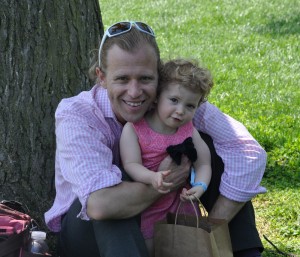Why Economics Falls Down in the Face of Fatherhood
I’ve been a dad now for a little less than two years, and I’m still trying to figure out how it is shaping my approach to economics. I think the answer is: A lot.
I learned economics in my twenties, before I became a dad. You know the drill: We learned hard math and complex models. Forget the Greek letters, they are just complicated ways of exploring the basic idea informing economics—that people are purposeful, analytic decision makers. And this idea just seemed entirely natural to me. I had always believed in the analytic self; I was rational, calculating, and tried to make smart decisions. Of course real people don’t use math, but I figured that we’re still weighing costs and benefits just as our models say. Or at least that was my understanding of the world.
Today, I’m not so sure.

Justin Wolfers and his daughter Matilda after a White House Easter egg roll.
My feelings toward my daughter Matilda aren’t easily expressed in analytic terms. I struggle to express it, just as I struggle to understand it. I think about my daughter, and I smile. Her laugh is the greatest joy, and it thrills me that she shares it with me. I’m fiercely protective of her, love (as you can tell) talking about her, and she’s central not only to my life, but to who I am. (You can hear more from me and Matilda in the second episode of the hour-long Freakonomics Radio show, “The Economist’s Guide to Parenting.”)
There’s something new and strange about all this. Today, I feel the powerful force of biology. It’s visceral; it’s real; it’s hormonal, and it’s not in our economic models. I’m helpless in the face of feelings that overwhelm me. Yes, I know that a twenty-something reader will cleverly point out that I just need to count kids as a good which yields utility, or perhaps we need to add a state variable to the utility function as in rational addiction models. But that’s not the point. I’m surprised by how little of this I’ve consciously chosen. While the economic framework accurately describes how I choose an apple over an orange, it has had surprisingly little to say about what has been the most important choice in my life.
And it’s not for want of trying. Today, I find myself wondering: Is parenthood a constant returns technology? That is: Would a second child bring as much joy as a first? But how could it? Since meeting Matilda, my heart is bursting with joy. Will it explode? Are the returns diminishing then? And if so, how fast? Forget self-interest; I’m not the only stakeholder in this debate. Beyond my better half, there’s Matilda, and the dozens of others she has brought joy to—her grandparents, aunts, uncles, and caregivers. There are the old ladies who smile as she walks down the street, the dads I share a knowing glance with, and all the good that will come from whatever lies ahead for my baby.
I’m a committed neoclassical economist. I learned it when I was at a point in my life when rational self-interest (broadly defined) seemed the right way to understand the world. But what kind of economists would we be if we learned our economics only after we were parents? It’s an interesting thought experiment, and truth is, I don’t know the answer. But slivers of evidence—my own introspection, conversations with other economist-parents, and even intriguing research showing the impact that daughters have on Congressman-dads—all tell me that it would be different.
And if you are also struggling to understand these issues: Happy Father’s Day.

Comments